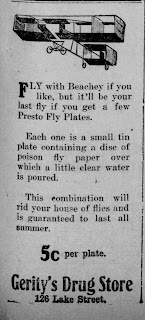By Susan Zehnder, Education Director
For two days in July 1911, thousands of people flocked to
Elmira’s Maple Avenue Park. What was it they paid .50 cents to attend, and an
additional .25 cents to sit in the grandstands to watch?
The event was The Curtiss-Beachy Aviation Meet organized by
the Star-Gazette newspaper. The meet brought together the latest in aviation technology
with the daring and flashy flying of a 24-year old pilot, named Lincoln
Beachey, whom the paper called the “greatest living birdman.” It was a
combination few could resist.
Airplanes were then in their infancy and the public was
fascinated with flying machines. Although the Wright brothers of Ohio gained
early fame for their aeronautical experiments, New York State was also a hub of
flying activity. Glenn Curtiss, or nearby Hammondsport, NY, was an aviation
pioneer and inventor, having successfully flown a plane of his own design in
1908. At the 1911 Elmira meet, the Glenn Curtiss exhibition team – which included
young men and at least one woman - showcased what Curtiss’s planes could do.
The team pushed limits by performing exhilarating airborne acrobatics.
At 24 years old, Curtiss pilot Lincoln Beachey was already considered
one of the best.
 |
| Lincoln Beachey |
Air shows, stunts and races were an exciting way for the public to see what airplanes could do. Before the Curtiss-Beachey Aviation Meet took place, The Star-Gazette dedicated the entire front page of its evening edition to the aeronautical event. Articles covered how to get to the meet, and what to expect at the event. Spectators were invited to view the Curtiss planes up close, to watch daring aviation exploits, and to observe skilled flying that demonstrated the usefulness of airplanes. The organizers charged a fee to watch, but nothing to park your automobile. Trolley schedules were doubled and ran on the half-minute. Businesses used the opportunity to advertise their products with aviation themes like this ad for pest control.
Joining the team and getting used to flying the new Curtiss designs, Beachey crashed three times. He wore a business suit while he flew, and was known for his modest and unassuming manner. Though at one time he donned women’s clothing and flew erratically in front of a shocked crowd to mock Miss Scott.
As a celebrity, the paper covered every move that Beachey made prior to flying and afterwards. Rorick’s Glen had an Aviator’s evening inviting Beachey to attend.
Beachey did not disappoint. Although he crashed three times while getting use to flying the new Curtiss designs, on the day of the meet he successfully performed loops and flybys. He demonstrated how planes could be useful in war to drop “bombs” onto targets, and he took up the challenge to race another vehicle. Known for his modest and unassuming manner, he wore a business suit while he flew. The exception is the flight later in his career during which he donned women’s clothing and flew erratically in front of a shocked crowd to mock Miss Scott.
The air-ground competition was the anticipated highlight of
the evening. Beachey flew a Curtiss Bi-Plane. His competitor, George Saulsman drove
a Chalmers 40 sponsored by the American-LaFrance Fire Engine Company. Saulsman
reached speeds of 70 mph as he rounded the track, but Beachey won the race.
Inspired by the crowd, speed, or lucrative nature of races, Beachey later
approached racecar driver Barney Oldfield driver from Ohio to repeat the stunt.
The two of them would go on to compete at more than 35 different venues around
the country, and together they earned more than $250,000, or over 6 million
dollars today.
The evening was a success, even though a heavy rainfall
interrupted events causing the crowd to temporarily relocate under the
grandstands until it passed.
Beachey would return to Elmira more three times to put on
airshows. But, in 1915, his daredevilry caught up with him, and he died in a
plane crash. He was 28 years old. Barney Oldfield lived until 1946, when he
died of a heart attack at 68.
 |
| Beachey flying in Elmira, 1912 |
The aerial speed show that flew over Elmira that July must have been thrilling to watch and well worth the .75 cents spent.


I see to remember when I was young (I am 81 now) hearing about a aerial show taking place on the south side.
ReplyDeleteYes, there were more than one!
ReplyDeleteWow what a thrilling day that must have been. Great piece of local history. Love the pics too.
ReplyDelete